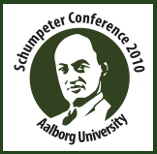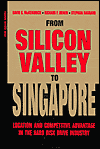
June 5, 2010
The full program of the Schumpeter Society Meeting in Aalborg, Denkmark is now posted.
Update June 22: Full papers of conferene are available here.
Photos from the Conference are now up. Gallery 1 Gallery 2


The full program of the Schumpeter Society Meeting in Aalborg, Denkmark is now posted.
Update June 22: Full papers of conferene are available here.
Photos from the Conference are now up. Gallery 1 Gallery 2

Agnus Maddison died. What economic historian has not relied on his historical GDP time series? Read the informative obituary in the Economist.

A workshop bringing together Business Historians and Evolutionary Economists is taking place at Trinity College in Dublin. Oveview information on the workshop and the presentation sldies have been posted in the discussion forum.

For a number of years, we have planned a complementary website to Evolutionary Theories in the Social Sciences that would serve as a central resource and meeting place for people who interested in empirical research on economic change. The English language features of Economic-Evolution.Net are now fully implemented. We recently finished the EEpedia, which functions as a collaborative encyclopedia collecting empirical facts on economic evolution. We have also added a software tool for a collaborative bibliography. Finally, we have created a convenient list of data sources to be used in research on economic evolution. Explore these feature by clicking on the menus to your left. To allow people who are not comfortable writing in English to participate in the EEpedia project, we are presently creating the German, Finnish, Norwegian and Swedish language versions of the EEpedia. Other language versions will follow later. If you want to receive automatic emails about new book reviews, data sources, conferences or working papers, can you subscribe to this service here.

Richard Nelson gave an interview in June 2002 to Margherita Fronte that still makes a good read today. In the interview, he explains why he developed evolutionary economics, discusses the relationship between science and technolgy, and takes a stand on what kinds of inventions should be patentable. Click on Read more for the full interview or go the website of the Fondazine Bassetti.

Telock does us the service of giving a close reading of three books that what to overcome the obstacle that Yogi Berra identified in his qib: “Prediction is very hard, especially about the future.”
The Fat Tail: The Power of Political Knowledge for Strategic Investing by Ian Bremmer and Preston Keat.
The Predictioneer’s Game: Using the Logic of Brazen Self-Interest to See and Shape the Future by Bruce Bueno de Mesquita
The Next 100 Years: A Forecast for the 21st Century by George Friedman
Read Telock’s excellent review at National Interest.

The Economist describes how the current strength of the the jet engine business come about. An understanding of the firm’s success requires some understanding of the technology that goes into its civil-aircraft engines. This is not just Rolls-Royce’s biggest business, it is also the one that both felled the company in 1971 and proved to be its salvation two decades later, Rolls-Royce’s triumph was not to build a slightly better engine and thus earn a temporary technological edge, but to design a completely different one. Remarkably, it did so from a position of weakness.

A symposium on the Varieties of Knowledge in the Economy with Carliss Baldwin, Richard Langois, Johann Peter Murmann and Richard Nelson will take place at the Schumpeter Conference in Brazil. More Details.

Robert Solow reviews Thomas K. Mccraw’s new biography of Joseph Schumpeter in the New Republic. Read the review of Prophet of Innovation: Joseph Schumpeter and Creative Destruction. Richard Langlois has also published a very useful review on EH.net.

The Comparative Industry Studies (CIS) Project
Evolutionary economists have articulated powerful theories about how industries change. During the last twenty years economists, sociologists, and business school scholars have begun to study empirically how particular industries develop over long periods of time. Because scholars frequently do not analyze the same aspects (variables), it often difficult to compare systematically across industries and figure out what causes lie behind the similarities and differences in patters of industry evolution.
To make it easier in future studies to compare across industries and come up with causal explanations, we need to formulate an analytical framework, i.e. a common list of characteristics that future studies could trace. Such a framework needs to combines concepts from traditional industrial organization economics, evolutionary economics, innovation studies, and institutional theory broadly defined. Participate in formulating this framework by going to the Comparative Industry Studies Project page in the EEpedia.

Timur Kuran has written a fascinating paper on Why the Middle East is economically underdeveloped. Anyone interested in social evolution will find this timely paper worth reading. Download Paper


A Workshop on Adaptation vs. Selection in Industrial Change will take place at the Academy of Management Meeting in New Orleans, August 7, 2004.

A Workshop on Cognitions and Capabilities is taking place at Harvard. Click here for details.
A workshop on “Empirical research on routines in business and economics: Towards a research program” will be held on the November 3-4 in Odense, Denmark. Click here for a call for papers.
The Fourth International Workshop on Institutional Economics will be held on the July 3 and 5 at the University of Hertfordshire, UK. Click here for details.
A roundtable on “Resources, Routines and Industrial Dynamics in the Experimentally Organized Economy” will be held on the October 24 and 25 in Hirtshals, Denmark. Click here for details. The first English translation of the seventh chapter of Schumpeter’s 1912 classic “Theory of Economic Evolution” will appear in a special issue on Industry and Innovation. Click here for a table of contents.
Evolutionary Theory in Management and Organization Theory at the Beginning of a New Millennium: A Symposium on the State of the Art and Opportunities for Future Research in Evolutionary Theory. You can now read a transcript of the symposium that took place on Aug 7 2000, in Toronto, Canada. The symposium was organized by Johann Peter Murmann, and the speakers were Howard Aldrich, Dan Levinthal and Sid Winter. Click here for conference details.
A conference took place in honor of the Richard R. Nelson at Columbia University in New York. Click here for details on the conference and the papers presented. You can read here Sidney Winter’s speech The Evolution of Dick Nelson and go on a photo tour.


Design Rules, Vol.1: The Power of Modularity by Carliss Baldwin and Kim Clark
From the Publisher: We live in a dynamic economic and commercial world, surrounded by objects of remarkable complexity and power. In many industries, changes in products and technologies have brought with them new kinds of firms and forms of organization. We are discovering news ways of structuring work, of bringing buyers and sellers together, and of creating and using market information. Although our fast-moving economy often seems to be outside of our influence or control, human beings create the things that create the market forces. Devices, software programs, production processes, contracts, firms, and markets are all the fruit of purposeful action: they are designed. Using the computer industry as an example, Carliss Y. Baldwin and Kim B. Clark develop a powerful theory of design and industrial evolution. They argue that the industry has experienced previously unimaginable levels of innovation and growth because it embraced the concept of modularity, building complex products from smaller subsystems that can be designed independently yet function together as a whole. Modularity freed designers to experiment with different approaches, as long as they obeyed the established design rules. Drawing upon the literatures of industrial organization, real options, and computer architecture, the authors provide insight into the forces of change that drive today’s economy.

 Tell a Friend
Tell a Friend